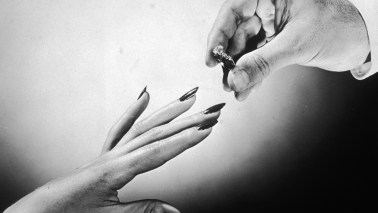Revolutionary Road
15, Nationwide
Revolutionary Road is Sam Mendes’s adaptation of the celebrated 1961 novel by Richard Yates and it may be too faithful to the book — big chunks of dialogue have been directly lifted — although, on the other hand, if it were less faithful then everyone would say it isn’t faithful enough, which proves what I would have said all along if I hadn’t just thought of it: literary novels are buggers to film.
But here it is, with Leonardo DiCaprio and Kate Winslet starring as Frank and April Wheeler, a young couple in 1950s America who, when they first marry, believe they are special and destined to be, as she puts it, ‘wonderful in the world’, but, seven years and two children in, where are they? They are just like any other married couple — he commutes to a job selling adding machines; she stays home — and live on Revolutionary Road, which could not be less revolutionary. It is part of a suburban development that is supposed, I guess, to symbolise deadening mediocrity, banality and conformity, although I don’t know. Why is it that novelists and film-makers always want to trash the suburbs? I grew up in a suburb and I’m fine, not a mediocre, banal, conformist at all. Heck, come round to my place one evening and, who knows, maybe I’ll even crack open my box set of The Good Life.
This is a bleak film, and hard-going, just as the book is bleak and hard-going. The book, by the way, has only lately been ‘rediscovered’, not that anyone will admit they’ve only just come to it. I first read it in 1909, for example. Or was it 1876? It was way, way before anyone else, anyhow. It’s about, so they say, the rot at the heart of the American dream, as seen through the prism of an imploding marriage, and it is ugly. Not Who’s Afraid of Virginia Woolf? ugly, but getting there. ‘But I don’t,’ says April when Frank asks her if she loves him. ‘I hate you.’ April is furious at the way things have turned out but believes the marriage can be cured by moving to Paris. ‘I want to feel things; really feel them,’ she implores. Frank agrees. Goes along with it.
There is a great scene when they tell their neighbours, Millie (Kathryn Hahn) and Shep (David Harbour), of their plans. Shep and Millie are stunned, then panic-stricken. Leave? Is it possible? And then, later, another great scene when, in front of Millie and Shep again, Frank confesses he’s been offered promotion at work and may take the job. At this, April looks at him out of the corner of her sunglasses, and it is a devastating look. Ms Winslet is good, always watchful and alert, although she may fail to capture fully April’s fragility. She is too physically strong, too physically there. It’s as if, at any moment, she could roll up her sleeves, grab an ox and go plough a field. Actually, that would do April a world of good. Take her out of herself and all that.
The real tragedy, perhaps, is not that Frank and April are trapped by suburbia, but that she cannot accept she is an ordinary woman married to an ordinary man, neither of whom has sufficient talent to make it otherwise. She is a failed actress while he has no known gifts at all. DiCaprio, who seems too childlike and sleepy at first, does manage to reveal properly the depths of Frank’s shallowness by the end and, in fact, I may even have believed in him rather more than her. The supporting cast, by the way, includes Kathy Bates as an estate agent whose crazy son, John (played by a scary Michael Shannon), perks up a dinner at the Wheelers by speaking the truth. Actually, he does more than perk it up. It is electrifying.
You know, this is a handsome, intelligent and careful adaptation which may be too bookish — the dialogue does feel as if it’s been lifted sometimes — and, then again, may not be bookish enough, may fail to capture the true quality of the novel. But, like I said, they are buggers, these books; real buggers. However, the film is always fully engrossing, even if it is too coolly detached to ever be involving. It isn’t like that last film Kate and Leo did together, the one where the big ship — the Titanic? — went down and we blubbed and blubbed, me more than most. I am not proud of this but do not think it signifies I’m suburban. Heck, come round one night and I’ll crack open the box set of The Good Life and Butterflies. How mad is that?





Comments